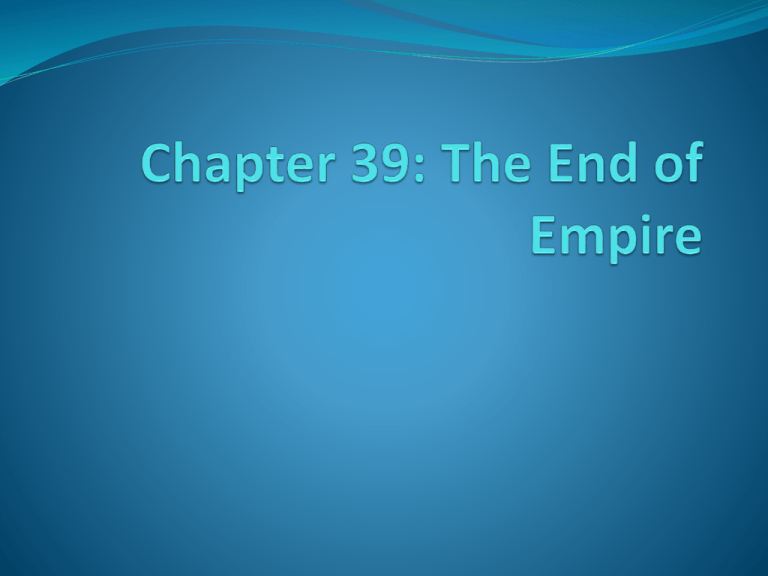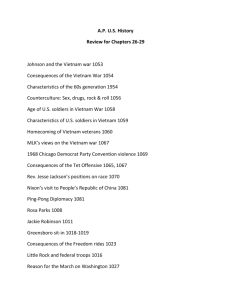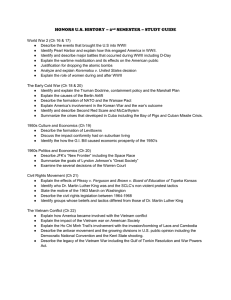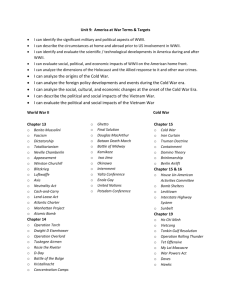Chapter 39: The End of Empire
advertisement

The End of Empire Before we get started This chapter requires you to consolidate the thinking you have done about comparisons and contrasts and continuities and changes-0ver-time regarding Asia, Africa, and Latin America throughout this book. Do something with this material as you read that will force you to think continuity and change-over-time as well as comparison and contrast since this chapter will figure prominently on the national exam. Independence in Asia Decolonization, like the Cold War, transformed the world after World War II. It sometimes brought newly independent states autonomy and self-determination; sometimes, however, pressures from cold war superpowers challenged these new nations to choose sides by aligning themselves with either capitalism or communism, often at the expense of their own independence. Achieving national unity, social stability, and economic prosperity would prove a challenging, lengthy, uncertain, and dangerous process Independence in Asia India’s Partitioned Independence Throughout the 1930s, relentless pressure from the Indian national Congress Party and Mohandas Gandhi, along with the Muslim league lead by Muhammad Ali Jinnah, compelled Great Britain to move gradually toward self-rule for its Indian domain. Constant conflict between Muslims and Hindus hampered India. Muslims feared being the minority Lead Muslims to flee to Pakistan and Hindus to stay in India. Conflict lead to war in the late 1940s resulting in over 1 million deaths. India continued to struggle as they attempted to stay neutral throughout the Cold War. Independence in Asia Nationalist Struggles in Vietnam Ho Chi Minh – Wanted Vietnamese independence since before WWI Made little progress in the 20s and 30s, but helped to oust Japan during WWII After WWII France regained control of much of South Vietnam. Vietnamese War for independence broke out between South Vietnam and France. Geneva Accords – 1954, France sued for peace after several humiliating defeats and Vietnam was split into a Communist North Vietnam and Non-Communist South Vietnam along the 17th parallel Ngo Dinh Diem came to power in South Vietnam Vietnam war ensued. 1973 Paris Peace Accords – U.S. withdrew from Vietnam 1976 – North Vietnam wins war Independence in Asia Arab National States and the Problem of Palestine Egypt, Syria, Iraq, Lebanon, and Jordan gained complete independence after the war. Palestine, however, proved to be a difficult problem Great Britain had controlled Palestine and made conflicting promises to Palestinian Arabs seeking a nation and to Jews emigrating to Palestine hoping to establish a homeland where they could escape persecution. In seeking to fulfill both conflicting promises, the British government allowed limited Jewish immigration to Palestine while simultaneously promising to protect the Palestinian Arabs’ civil and economic rights. Independence in Asia The Problem of Palestine WWII made the problem more complex. The Holocaust increased the pressure on the British government and the free world to make good on a promise of a secure homeland for the Jews. Britain turned the problem over to the United Nations UN decided that two states, one Arab and one Jewish, would be created. Civil War broke out as a result and the Jews announced the creation of an independent state… Israel. Jews were able to maintain their independent state with the support of the U.S. (partly due to oil interests), in spite of constant Arab opposition. Southwest Asia … aka The Middle East continues to be a point of confrontation. Decolonization in Africa The Cold War also affected decolonization in Africa, a process already complicated by reluctant colonial powers and internal tribal conflicts. Forcing the French out of North Africa French resisted decolonization in North Africa, especially in Algeria. Algerian War of Independence – (1954-1962) Pitted the National Liberation Front (revolutionaries) against more than half a million French Soldiers. Very violent conflict. Decolonization in Africa Black African Nationalism and Independence Black Nationalism celebrated Africa’s great poets, writers, traditions, and cultures. Cold war complicated the matter of African independence Ghana was the first sub-Saharan African nation to become independent in March 1957. Nations like Rwanda, Burundi, and Angola would become independent much later, which much violence and bloodshed. Decolonization of Africa Freedom and Conflict in Sub-Saharan Africa Not all decolonization was peaceful as it had been in Ghana. Example… Kenya Prolonged violence between the British military and Kenyans lasted from 1947 through 1959. After the death of almost twelve thousand Kenyans, Kenya gained its independence in 1963. After Independence: Long-Term Struggles in the Postcolonial Era Political and economic stability was elusive in developing nations seeking to avoid domination by more powerful nations. Continued interference by surrounding or superpower nations, local elites trying to maintain their status through imperial ties, or internal divisions prevented development of a clear national identity, caused revolution or war in almost all these postcolonial nations. After Independence: Long-term Struggles in the Postcolonial Era Communism and Democracy in Asia China Mao Zedong – United China under Communism following WWII Envisioned a “Great Leap Forward” for China from 1958-1961 to push industrial and agricultural production by abolishing all private property and by communalizing all farming and industry. Ended in disaster as 20 million Chinese starved to death. Cultural Revolution sought to oust communist opposition following the Great Leap Forward and resulted in the death of millions more Deng Xiaoping Mao’s successor Attempted to modernize China by sending students to western universities. Led to a pro-democracy youth movement in China that was bloodily crushed in Tiananmen square in 1989. India Attempted to maintain political responsibility and democracy. Plagued by problems like extreme population growth and food shortages, brutal assassinations and continued quests for peace and religious tolerance seem to be the the pattern in modern India After Independence: Long-term Struggles in the Postcolonial Era Islamic Resurgence in Southwest Asia and North Africa





